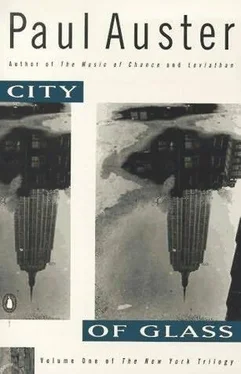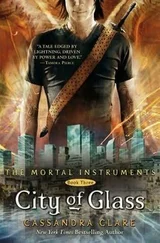Paul Auster - City of Glass
Здесь есть возможность читать онлайн «Paul Auster - City of Glass» весь текст электронной книги совершенно бесплатно (целиком полную версию без сокращений). В некоторых случаях можно слушать аудио, скачать через торрент в формате fb2 и присутствует краткое содержание. Жанр: Современная проза, на английском языке. Описание произведения, (предисловие) а так же отзывы посетителей доступны на портале библиотеки ЛибКат.
- Название:City of Glass
- Автор:
- Жанр:
- Год:неизвестен
- ISBN:нет данных
- Рейтинг книги:5 / 5. Голосов: 1
-
Избранное:Добавить в избранное
- Отзывы:
-
Ваша оценка:
- 100
- 1
- 2
- 3
- 4
- 5
City of Glass: краткое содержание, описание и аннотация
Предлагаем к чтению аннотацию, описание, краткое содержание или предисловие (зависит от того, что написал сам автор книги «City of Glass»). Если вы не нашли необходимую информацию о книге — напишите в комментариях, мы постараемся отыскать её.
City of Glass — читать онлайн бесплатно полную книгу (весь текст) целиком
Ниже представлен текст книги, разбитый по страницам. Система сохранения места последней прочитанной страницы, позволяет с удобством читать онлайн бесплатно книгу «City of Glass», без необходимости каждый раз заново искать на чём Вы остановились. Поставьте закладку, и сможете в любой момент перейти на страницу, на которой закончили чтение.
Интервал:
Закладка:
"I'm sorry there's not a more recent photograph," Virginia Stillman was saying. "This one dates from more than twenty years ago. But I'm afraid it's the best I can do. "
Quinn looked at the picture of Stillman's face, hoping for a sudden epiphany, some sudden rush of subterranean knowledge that would help him to understand the man. But the picture told him nothing. It was no more than a picture of a man. He studied it for a moment longer and concluded that it could just as easily have been anyone.
"I'll look at it more carefully when I get home," he said, putting it into the same pocket where the check had gone. "Taking the passage of time into account, I'm sure I'll be able to recognize him at the station tomorrow."
"I hope so," said Virginia Stillman. "It's terribly important, and I'm counting on you."
"Don't worry," said Quinn. "I haven't let anyone down yet."
She walked him to the door. For several seconds they stood there in silence, not knowing whether there was something to add or if the time had come to say good-bye. In that tiny interval, Virginia Stillman suddenly threw her arms around Quinn, sought out his lips with her own, and kissed him passionately, driving her tongue deep inside his mouth. Quinn was so taken off guard that he almost failed to enjoy it.
When he was at last able to breathe again, Mrs. Stillman held him at arm's length and said, "That was to prove that Peter wasn't telling you the truth. It’s very important that you believe me."
"I believe you," said Quinn. "And even if I didn't believe you it wouldn't really matter."
"I just wanted you to know what I'm capable of."
"I think I have a good idea."
She took his right hand in her two hands and kissed it. "Thank you, Mr. Auster. I really do think you're the answer."
He promised he would call her the next night, and then he found himself walking out the door, taking the elevator downstairs, and leaving the building. It was past midnight when he hit the street.
4
QUINN had heard of cases like Peter Stillman before. Back in the days of his other life, not long after his own son was born, he had written a review of a book about the wild boy of Aveyron, and at the time he had done some research on the subject. As far as he could remember, the earliest account of such an experiment appeared in the writings of Herodotus: the Egyptian pharaoh Psamtik isolated two infants in the seventh century B.C. and commanded the servant in charge of them never to utter a word in their presence. According to Herodotus, a notoriously unreliable chronicler, the children learned to speak-their first word being the Phrygian word for bread. In the Middle Ages, the Holy Roman Emperor Frederick II repeated the experiment, hoping to discover man's true "natural language" using similar methods, but the children died before they ever spoke any words. Finally, in what was undoubtedly a hoax, the early sixteenth-century King of Scotland, James IV, claimed that Scottish children isolated in the same manner wound up speaking "very good Hebrew."
Cranks and ideologues, however, were not the only ones interested in the subject. Even so sane and skeptical a man as Montaigne considered the question carefully, and in his most important essay, the Apology for Raymond Sebond, he wrote: "I believe that a child who had been brought up in complete solitude, remote from all association (which would be a hard experiment to make), would have some sort of speech to express his ideas. And it is not credible that Nature has denied us this resource that she has given to many other animals… But it is yet to be known what language this child would speak; and what has been said about it by conjecture has not much appearance of truth. "
Beyond the cases of such experiments, there were also the cases of accidental isolation-children lost in the woods, sailors marooned on islands, children brought up by wolves-as well as the cases of cruel and sadistic parents who locked up their children, chained them to beds, beat them in closets, tortured them for no other reason than the compulsions of their own madness-and Quinn had read through the extensive literature devoted to these stories. There was the Scottish sailor Alexander Selkirk (thought by some to be the model for Robinson Crusoe) who had lived for four years alone on an island o the coast of Chile and who, according to the ship captain who rescued him in 1708, "had so much forgot his language for want of use, that we could scarce understand him." Less than twenty years later, Peter of Hanover, a wild child of about fourteen, who had been discovered mute and naked in a forest outside the German town of Hamelin, was brought to the English court under the special protection of George I. Both Swift and Defoe were given a chance to see him, and the experience led to Defoe's 1726 pamphlet, Mere Nature Delineated. Peter never learned to speak, however, and several months later was sent to the country, where he lived to the age of seventy, with no interest in sex, money, or other worldly matters. Then there was the case of Victor, the wild boy of Aveyron, who was found in 1800. Under the patient and meticulous care of Dr. Itard, Victor learned some of the rudiments of speech, but he never progressed beyond the level of a small child. Even better know than Victor was Kaspar Hauser, who appeared one afternoon in Nuremberg in 1828, dressed in an outlandish costume and barely able to utter an intelligible sound. He was able to write his name, but in all other respects he behaved like an infant. Adopted by the town and entrusted to the care of a local teacher, he spent his days sitting on the floor playing with toy horses, eating only bread and water. Kaspar nevertheless developed. He became an excellent horseman, became obsessively neat, had a passion for the colors red and white, and by all accounts displayed an extraordinary memory, especially for names and faces. Still, he preferred to remain indoors, shunned bright light, and, like Peter of Hanover, never showed any interest in sex or money. As the memory of his past gradually came back to him, be was able to recall how he had spent many years the floor of a darkened room, fed by a man who never spoke him or let himself be seen. Not long after these disclosure Kasper was murdered by an unknown man with a dagger in public park.
It had been years now since Quinn had allowed himself to think of these stories. The subject of children was too painful for him, especially children who had suffered, had been mistreated, had died before they could grow up. If Stillman was the man with the dagger, come back to avenge himself on the boy whose life he had destroyed, Quinn wanted to be there to stop him. He knew he could not bring his own son back to life, but at least he could prevent another from dying. It had suddenly become possible for him to do this, and standing there on the street now, the idea of what lay before him loomed up like a terrible dream. He thought of the little coffin that held his son's body and how he had seen it on the day of the funeral being lowered into the ground. That was isolation, he said to himself. That was silence. It did not help, perhaps, that his son's name had also been Peter.
5
AT the corner of 72nd Street and Madison Avenue, he waved down a cab. As the car rattled through the park toward the West Side, Quinn looked out the window and wondered if these were the same trees that Peter Stillman saw when he walked out into the air and the light. He wondered if Peter saw the same things he did, or whether the world was a different place for him. And if a tree was not a tree, he wondered what it really was.
After the cab had dropped him off in front of his house, Quinn realized that he was hungry. He had not eaten since breakfast early that morning. It was strange, he thought, how quickly time had passed in the Stillman apartment. If his calculations were correct, he had been there for more than fourteen hours. Within himself, however, it felt as though his stay had lasted three or four hours at most. He shrugged at the discrepancy and said to himself, "I must learn to look at my watch more often. "
Читать дальшеИнтервал:
Закладка:
Похожие книги на «City of Glass»
Представляем Вашему вниманию похожие книги на «City of Glass» списком для выбора. Мы отобрали схожую по названию и смыслу литературу в надежде предоставить читателям больше вариантов отыскать новые, интересные, ещё непрочитанные произведения.
Обсуждение, отзывы о книге «City of Glass» и просто собственные мнения читателей. Оставьте ваши комментарии, напишите, что Вы думаете о произведении, его смысле или главных героях. Укажите что конкретно понравилось, а что нет, и почему Вы так считаете.












